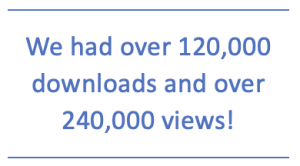Post by Kirsty Wallis, OOSS Coordinator/ Harry Ortiz Venegas, OOSS Support Officer
Those of us that actively support Open Science initiatives often recognise that there is a way to go and in some places there are big changes that may need to be made in order to succeed. Being UCL, a research-intensive university, we recognise and embrace the role of higher education institutions within this transformation and commit to facilitating the necessary dialogues inside the academic field, our student and staff body, and the wider community.
The Office for Open Science & Scholarship (OOSS) team, part of the Library, Culture, Collections and Open Science (LCCOS) department, is one of the crucial actors inside our institution in embracing Open Science values and promoting and advocating for these complex transitions to happen.
We propose that one of the changes that needs to happen is around the concept of authorship and what it means to all of the actors involved in research. We recognise that there are already a number of changes happening in this area, with initiatives like CRedIT, and rights retention for authors, but we wanted to look at it from a different angle. In the OOSS, we focus very heavily on the diversity and inclusiveness of our support services and the research we have at UCL, and so we work hard to allow the participation of diverse stakeholders in the design of open, accessible and inclusive research practices.
Resonating with the UCL Open Science Conference 2023 theme ‘Open Science and the Case for Social Justice’, the team proposed facilitating a workshop at the end of the day to discuss some of the long-standing issues concerning credit and authorship in research practice.
 As the invitation to the final activity from the conference said, ‘Often, participants in research projects do not get credit for their significant contributions in the process, but what role should they have? People involved in a research project can hold a plethora of roles, from community leaders, patients, and citizen scientists outside the academy, to academics, research assistants, technicians, librarians, data stewards and coders within. How can we promote fairer practices and encompass all of these roles in our research outputs?’
As the invitation to the final activity from the conference said, ‘Often, participants in research projects do not get credit for their significant contributions in the process, but what role should they have? People involved in a research project can hold a plethora of roles, from community leaders, patients, and citizen scientists outside the academy, to academics, research assistants, technicians, librarians, data stewards and coders within. How can we promote fairer practices and encompass all of these roles in our research outputs?’
With a clear idea in mind, it was necessary to design a participatory workshop that included researchers, but also the less-heard voices and collaborators who do not often figure in academic reports. In this session, two outstanding teams from UCL joined the adventure, the Co-Production Collective, a diverse and growing community of people from various backgrounds who come together to learn, connect, and champion co-production for lasting change. Providing consultancy, delivering training and presentations, and participating in the design and implementation of research projects, all with community members involved. And The Institute for Global Prosperity (IGP), part of The Bartlett, UCL Faculty for the Built Environment. Focused on redesigning prosperity for the 21st century, changing how we conceive and run our economies, and reworking our relationship with the planet. IGP’s vision is to build a prosperous, sustainable, global future, underpinned by the principles of fairness and justice, and allied to a realistic, long-term vision of humanity’s place in the world. As they both state on their web pages.
All teams circulated the invitation with their networks to ensure participation from a range of people, not only from academic backgrounds. Ending up in a hybrid event with around 60 participants. To promote the discussion, the workshop team prepared the ground with the case study ‘Co-Producing Prosperity Research in Informal Settlements in Tanzania’, an IGP project. Raising questions around how crucial it is to acknowledge all the contributions to knowledge production and language barriers in current publishing models. Followed by lived experience cases presented in first person by three members of the Co-Production Collective. Involving diverse perspectives, engagement levels, and roles in research projects.
The facilitators divided the in-person assistants around circular tables and the online people into break-out rooms to discuss ‘What challenges and opportunities need to be addressed to create equitable conditions in relation to authorship?’.
 Each table were asked to summarise their conversations, sharing some of their ideas at the end of the session. People from the conference committee took notes to share with the OOSS team and report the workshop’s principal outcomes. These outcomes will be folded into the wider work being undertaken at UCL currently around preparing a statement on authorship for our community.
Each table were asked to summarise their conversations, sharing some of their ideas at the end of the session. People from the conference committee took notes to share with the OOSS team and report the workshop’s principal outcomes. These outcomes will be folded into the wider work being undertaken at UCL currently around preparing a statement on authorship for our community.
There were a number of themes that came out of the discussions and what was the most interesting for the facilitators was the extent of the consensus on many of the core points.
There was widespread agreement that all contributors to research should be acknowledged, and that they should be credited in any publications they take an active part in. There was also agreement that decisions about roles in the project and its outputs should be discussed and agreed at the outset of the project, with non-academic participants such as technicians, librarians, citizen scientists and other types of participants being given enough information to make an informed decision about what role they would like to take in publications and if that takes place, if and how they would like to be credited.
As we described at the outset of this post, we realise that this is not easy to unpick and the real value in these discussions will come from the challenges identified and opportunities we can pursue. It is easy to see the benefits that creating more equitable conditions in authorship can provide, allowing knowledge to be more granular and diversifying the opinions that can be represented, but the workshop also allowed us to dig into some real practical issues, some of which are presented below.
One major theme that emerged was in relation to research culture and the institutional inertia with regards to publishing. The lingering ‘publish or perish’ attitude in some subject areas leads to a very rapid turnaround on papers, and a perceived unwillingness to dilute credit with other names, especially in subject areas where positionality in the author list has value. There were also issues raised around the power dynamics associated with authorship and where control lies over this process, with the people who wrote the article, or the PI/research team leader who has ultimate control.
Another theme was more practical in nature and was related to systems and affiliations. In many cases it is very difficult to include an unaffiliated author, both in some publisher systems and even in some metadata schema. Also being able to give access to institutional systems and tools is also often associated with an affiliated email address. Lastly, in many cases, it is assumed all authors of a paper are able to take equal responsibility for it (CReDiT is changing this, by allowing people to be associated with the role they played, but it is early days), but in the case of a controversial topic, an unaffiliated author may be at risk as they are unable to access the support that the university will provide for its community, such as access to legal support or a press office.
The final significant theme was around language, style and terminology. Some groups pointed out that some of the understanding inherent to academia has very little meaning outside of the bubble of the university, and while external team members associated with a project will be trained to work to the integrity and ethical standards of the project, they may not be able to commit to the academic language, theoretical structures or terminology required to be involved in publications.
The good news is that all of these themes (and a lot of the other points we weren’t able to cover here) can be turned into opportunities. The first theme around research culture I think we are already addressing by starting this conversation and committing to including these findings in UCL statements and associated guidance on authorship. We will be consulting widely among the academic community and beyond throughout the process and hopefully this will allow us to challenge some of the issues raised about power dynamics and point out where people can and should be opening up their author lists to new individuals.
Another opportunity that came up in the sessions was around other types of publication. The discussion was framed around the traditional article/book, but the point was raised that there are a wide range of outputs that can come out of a project that can acknowledge different individuals, from the technical such as data, software or code, to presentations and posters, giving new individuals the chance to represent the research they have done in a new environment, and even media such as videos or exhibitions. There are definitely opportunities outside the traditional and this needs to be reflected and tied into the wider Open Science movement where we are shifting the focus onto new forms of output. It is also important that in this, space is given to the participants and citizen scientists to express what would be the most effective way of communicating the research results back to the community they effect.
This is just a very short summary of what was an intense and very nuanced conversation across around ten separate breakout groups and we were immensely grateful to the whole community for engaging with the workshop and being so open and honest about their experiences to allow us such insight to take forward into our explorations of authorship in the OOSS. The Co-Production Collective shared some interesting reflections about the workshop discussions on their webpage, exposing how participants contributing from the live-experience field are commonly left out in credits, authorship and contribution acknowledgements.
The April 24th conference resonated among members of their collective to take take a step forward, telling, one of them commented that “it made me pluck up the courage to ask to be an author on a project I set up and did the initial work on, and the professor received it really well and said well done for getting in touch and rightfully asking as these things can be daunting and missed…”
 Over the past year…
Over the past year… The UCL Office for Open Science and Scholarship invites you to contribute to the open science and scholarship movement. Stay connected for updates, events, and opportunities. Follow us on X, formerly Twitter, and join our mailing list to be part of the conversation!
The UCL Office for Open Science and Scholarship invites you to contribute to the open science and scholarship movement. Stay connected for updates, events, and opportunities. Follow us on X, formerly Twitter, and join our mailing list to be part of the conversation! Close
Close












